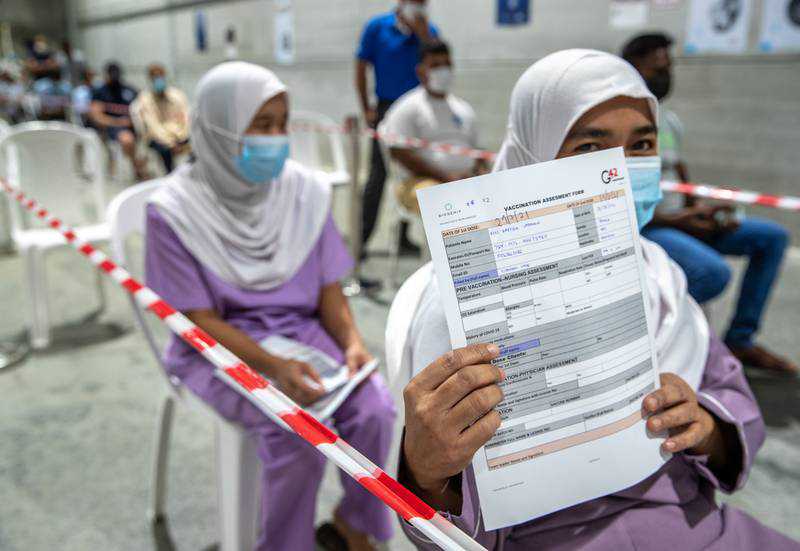UAE moves up to third in ranking of best places to live globally during Covid pandemic
28 October, 2021

The UAE has been ranked third in the world in a league table looking at how well countries are controlling the coronavirus while at the same time reopening their economies.
The Emirates were behind only Ireland and Spain in the Bloomberg Covid Resilience Ranking, which is published monthly by the business news agency.
A continued decrease in the number of cases and deaths, coupled with very high vaccination rates, enabled the Emirates to jump three places since the last table was released.
Ireland and Spain occupy the top two spots, and other European nations take up most of the rest of the top 10 thanks to case numbers being under control and restrictions having been partly relaxed.
The UAE, which has had slightly under three quarters of a million Covid-19 cases and 2,135 deaths, has experienced a dramatic improvement in its control of the pandemic after its most recent peak in May and June.
There are now fewer than 1,000 cases a week, the lowest for more than a year, while the total number of deaths has been in single figures in recent weeks.
A very high vaccination rate, of 97.3 per cent – the world’s highest – also contributes to the UAE’s overall Bloomberg Resilience Score of 74.6.
The top scorer, Ireland, has a resilience score of 75.1, and was praised for its high vaccination rate and cautious moves towards reopening, although Bloomberg named the country as one of several to have seen a “worrying uptick” in case numbers.
Spain, with a score of 74.6, gains plaudits for easing Covid restrictions and for bringing weekly case numbers down to slightly above 10,000, compared to almost 190,000 at one point in July.
Dr Bharat Pankhania, a senior clinical lecturer and consultant in communicable disease control at the University of Exeter in the UK, said many European countries were coping well because they were continuing to take basic precautions.
“Countries like Greece, Germany, France, Spain and Italy, they wear their masks and get on with it, and their case numbers are low,” he told The National.
He contrasted the relative success of these countries at maintaining lower case rates with the UK, which fell nine places to 25th position over the past month because of rising case numbers. Covid-related deaths in the UK are running at an average of more than 100 a day.
“The UK has adopted a laissez-faire attitude, so there’s a groundswell of, ‘We don’t want to wear masks and we don’t want to take precautions,’ and we’re behind with our immunisation,” he said.
The top 20 includes Saudi Arabia, which is placed 15th with a Bloomberg Resilience Score of 68.5.
It has a slightly lower vaccination rate, of 66.5 per cent, and slightly tougher restrictions than most countries in the top 10.
Another notable inclusion in the upper reaches of the table is Chile, in eighth position, whose rise of 23 places over the past month reflects an improved situation in South America as a whole.
The Bloomberg Covid Resilience Ranking, which measures the world’s top 53 economies, is not simply an indicator of how well a country is controlling the coronavirus.
Nations (such as China in 28th position) with very low case and death rates but tougher Covid-related restrictions may score below others (such as the UK) with far higher case numbers and death rates but with fewer limitations.
Measures such as vaccination coverage, quality of healthcare, mortality rates and the extent to which travel has restarted are used to compile the table.
Bloomberg noted that countries in South-East Asia such as Malaysia, Thailand, Vietnam and the Philippines remained in the bottom six of the table for the third month.
While Malaysia, with 75.6 per cent of people fully vaccinated, has a relatively high immunisation rate, the others are lagging, with Thailand having 50.6 per cent fully vaccinated, Vietnam 37.8 per cent and the Philippines on 26 per cent, according to Bloomberg.
“If they haven’t got vaccination coverage in the high 80s, then you always have that fear that people who are not immunised will get severe disease and they will overwhelm the hospital system,” Dr Pankhania said.
Although they are trying to immunise their populations, Dr Pankhania said many nations in South-East Asia had been hampered by a lack of vaccine supply.
Source: www.thenationalnews.com
